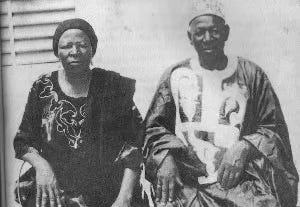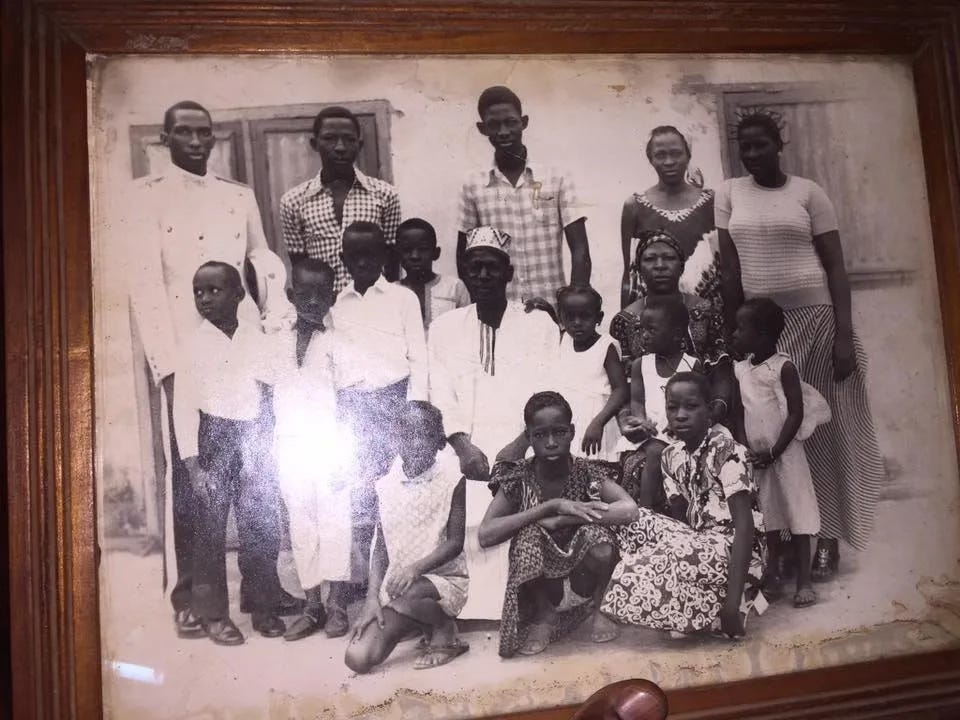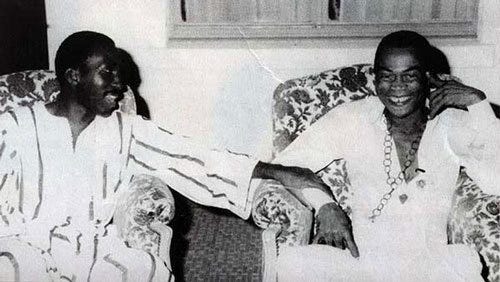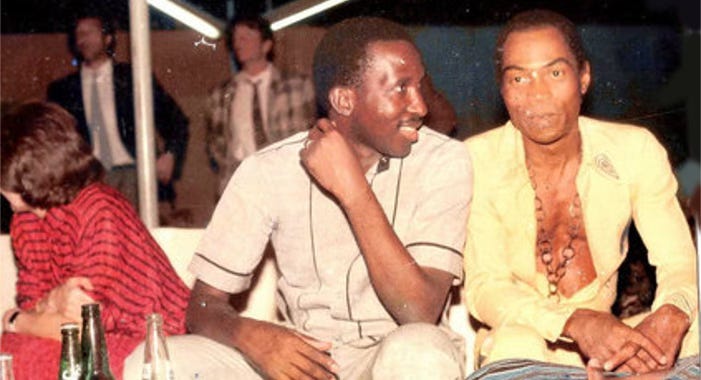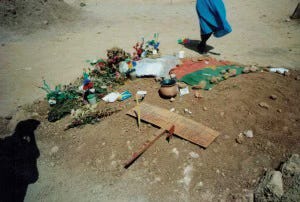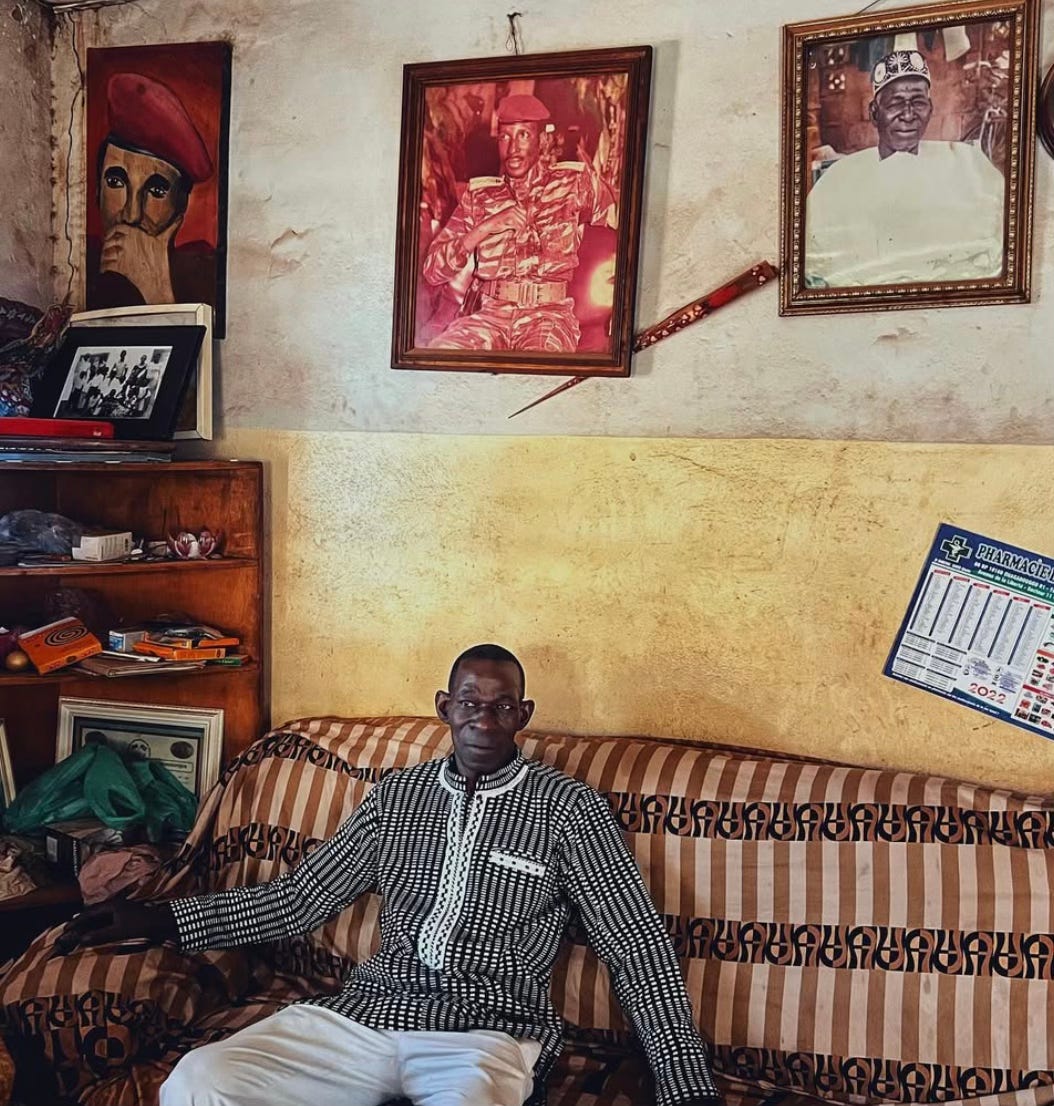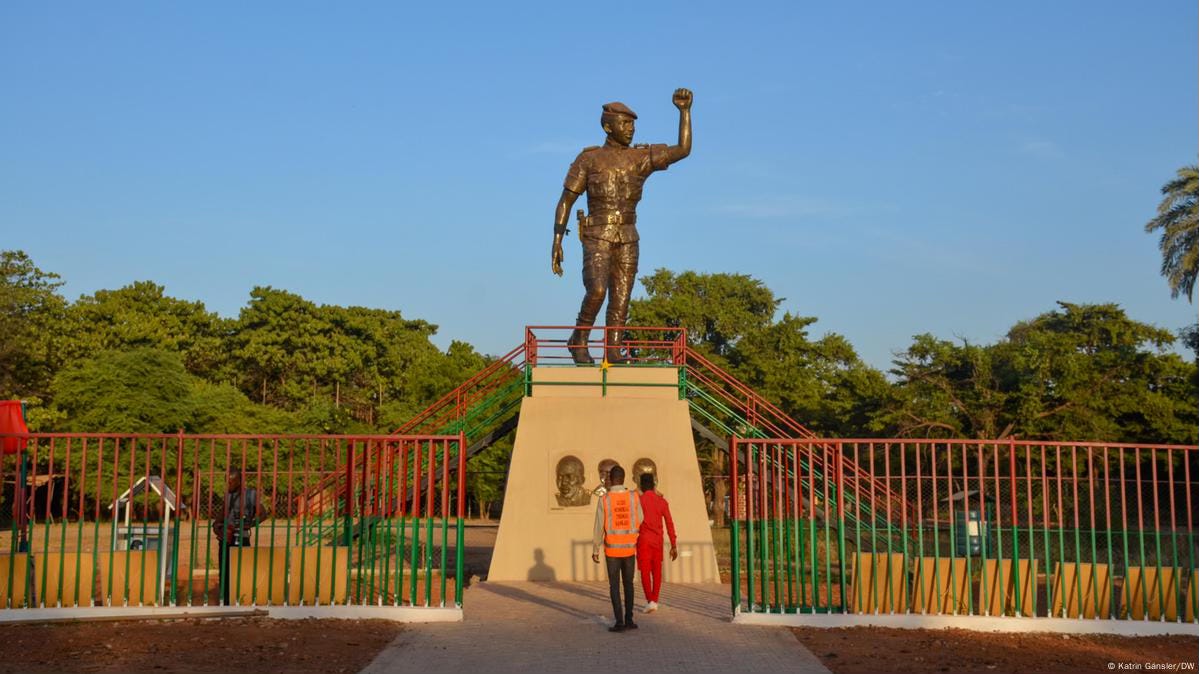Thomas Sankara: Africa's Revolutionary Leader Who Redefined Burkina Faso
The Life, Policies, Ultimate Betrayal and Lasting Impact of a Leader Committed to Justice, Independence, and Social Change.
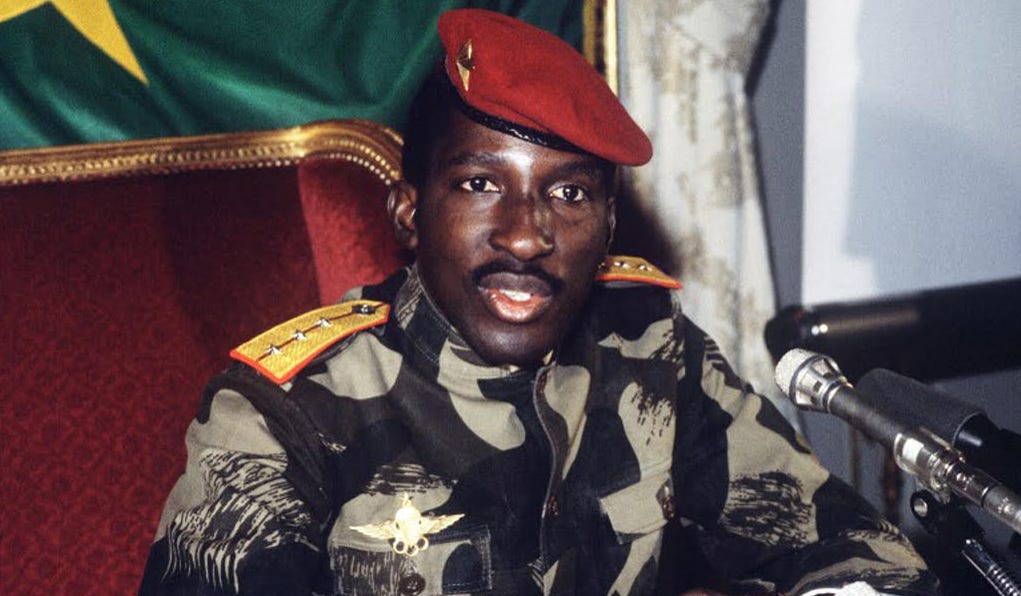
Introduction
Thomas Sankara, a name synonymous with revolutionary ideals, is often hailed as the "Che Guevara of Africa." Born into the Mossi ethnic group of Burkina Faso, Sankara rose to prominence as a leader committed to transforming not only his country but also the African continent. His presidency from 1983 to 1987 marked a radical departure from the status quo, with reforms that prioritized self-reliance, gender equality, and anti-corruption. However, his life and vision were cut short by betrayal from his closest ally, Blaise Compaoré, in a coup that reversed much of his work.
Today, Sankara’s ideas endure, resonating through art, music, and activism. His legacy is memorialized in landmarks like the Thomas Sankara Memorial, in songs like Alpha Blondy’s “Thomas Sankara,” and in the hearts of millions worldwide who continue to fight for justice and equality.
Early Life and Mossi Roots
Born on December 21, 1949, in Yako, Upper Volta (now Burkina Faso), Thomas Isidore Noël Sankara came from a modest family within the Mossi ethnic group, the largest in the country. His father, a former French colonial soldier, and his mother, a devout Catholic, emphasized discipline and education, shaping Sankara’s early years.
Sankara’s brilliance as a student earned him a scholarship to a military academy, where he quickly gained a reputation as a disciplined and politically astute individual. His military training exposed him to the works of Marxist and anti-colonial thinkers, which deeply influenced his ideology. His deployment to Madagascar during a period of anti-colonial uprisings cemented his revolutionary worldview.
A Visionary Leader
By 1983, Sankara, then Prime Minister of Upper Volta, led a coup supported by a coalition of young officers and civilians, catapulting him to the presidency at just 33 years old. One of his first acts was to rename the country Burkina Faso, meaning “Land of Upright People,” rejecting the colonial name “Upper Volta.”

1. Food Sovereignty:
Sankara’s agricultural reforms included redistributing land from feudal landlords to peasant farmers. This, combined with irrigation and education initiatives, dramatically increased food production. Burkina Faso became nearly self-sufficient in food within four years, with surplus grain harvests widely celebrated.
2. Women’s Rights:
Sankara was a feminist in action. His government outlawed female genital mutilation, polygamy, and forced marriages while championing women’s education and workforce participation. Women served in key government roles and even the military under his leadership.
3. Anti-Corruption and Austerity:
A staunch opponent of governmental excess, Sankara slashed ministerial salaries, banned luxury imports, and sold off expensive government cars, opting for a modest Renault 5 himself.
4. Health and Education:
Through mass vaccination campaigns, Sankara’s government eradicated major diseases like polio and measles. His literacy programs improved national literacy rates significantly, and his emphasis on education aimed to empower the Burkinabé people.
5. Environmental Reforms:
Sankara spearheaded an ambitious tree-planting campaign to combat desertification, planting millions of trees across the Sahel. His sustainable development initiatives remain a model for environmental advocacy in Africa.

Sankara Fun Fact: His Guitars, Music and the National Anthem

While Thomas Sankara is best remembered for his revolutionary leadership and unwavering commitment to justice, his deep love for music also played a significant role in his life and political vision. A talented musician, Sankara was known to play in a jazz band, blending his political ideals with his passion for art. Music, for him, was more than entertainment—it was a unifying force and a medium for cultural expression.
He composed Burkina Faso’s national anthem, imbuing it with themes of pride and self-reliance, reflecting his broader goals for the nation. His connection to music extended beyond personal creativity; he was also a close friend of Nigerian Afrobeat legend and political activist Fela Anikulapo-Kuti. Their friendship symbolized a shared belief in the transformative power of art in challenging oppression and promoting African liberation.

A fact that is not fun: Thomas Sankara was assassinated on Fela’s birthday, October 15th 1987. In an interview following Sankara’s assassination that was carried out boy his own men, Fela remarked,
“His departure is a terrible blow to the political life of Africans, because he was the only one talking about African unity, what Africans need, to progress. He was the only one talking. His loss is bad (Long silence) but my mind is cool because Sankara’s death must have a meaning for Africa. Now that Sankara has been killed, if the leader of Burkina Faso, today, is not doing well, you will see it clearly. This means that in [the] future, bad leaders would be very careful in killing good leaders…”
At the time of his assassination, Sankara had very few personal possessions, a reflection of his revolutionary lifestyle. He owned at least two guitars at the time of his death: a Spanish guitar and a classical guitar. He believed in simplicity and austerity, emphasizing self-reliance over material wealth. In addition to his guitars, his belongings included his military uniform, a few writings, and personal notes. These items, while modest in number, are powerful symbols of his commitment to a vision of a free, independent, and self-sufficient Burkina Faso. Sankara’s rejection of luxury and accumulation of personal wealth was integral to his leadership, and his limited possessions were a testament to his dedication to the revolutionary cause and the ideals of equality and modesty that he championed.
Betrayal and the Undoing of a Revolution
Despite his popularity among the people, Sankara’s bold reforms made him enemies within the elite and abroad. His refusal to take loans from the IMF and World Bank alienated Western governments, while his socialist policies threatened local power structures.
On October 15, 1987, Blaise Compaoré, Sankara’s closest ally, orchestrated a coup, assassinating Sankara and seizing power.
Under Compaoré:
Foreign aid dependency resumed.
Privatization dismantled public ownership of key industries.
Corruption replaced Sankara’s transparent governance.

Joan Baxter, a Canadian journalist and development expert, described the coup as the burial of Africa’s hope for self-determination, a sentiment echoed by many who saw Sankara as a symbol of African resistance to neocolonial exploitation.
The Reburial of Thomas Sankara
The reburial of Thomas Sankara took place in 2023, over three decades after his assassination. It was prompted by the renewed investigation into his death, which began after the 2014 uprising that ousted Blaise Compaoré. Sankara’s remains were exhumed in 2015, and the trial of those responsible for his death finally gained momentum under Burkina Faso's military leadership in 2022-2023.
The reburial was organized by the government under the leadership of Captain Ibrahim Traoré. It was intended to honor Sankara as a national hero, and his remains were laid to rest near the site of his assassination. The decision was made due to national and security reasons, with the government hoping to close a painful chapter in the country's history.
However, Sankara's widow, Mariam, and their children chose to boycott the reburial. They disagreed with the location, feeling that it would only stir up division rather than bring healing. Instead, they had hoped for a burial site that would promote unity and peace, rather than continue the political tensions tied to his death.
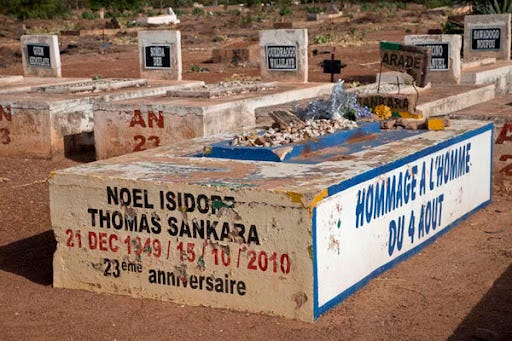
Despite the reburial, the Sankara family remains focused on seeking justice for his assassination, emphasizing that their efforts are about honoring his legacy in a way that is respectful to the memory of the man they loved.
The Sankara Family
Thomas Sankara’s widow, Mariam Sankara, and their children have faced a tumultuous path since his assassination. After Sankara's death in 1987, Mariam fled Burkina Faso and spent about 20 years in exile in France. She returned in 2007 and has been an outspoken advocate for justice regarding his assassination. However, in 2023, Mariam and their children boycotted his reburial, as they opposed his reburial at the assassination site, preferring a location that would allow for healing and unity.

As for the Sankara children, little is widely known about them today. Mariam has kept them out of the public spotlight for the most part, but their decision to distance themselves from the reburial indicates they are still affected by the legacy of their father's death. The Sankara family remains involved in political activism, particularly in calls for justice and truth about Thomas Sankara’s assassination.
Their refusal to attend the reburial highlights lingering divisions in Burkina Faso’s political landscape, especially over the memory of Sankara's revolutionary ideals, which continue to inspire many, despite the complex legacies of his death and the leadership that followed.
A Legacy That Endures
Despite the ongoing political turmoil, the ideals and vision of Thomas Sankara continue to inspire generations. Figures from Burkina Faso’s civil society, such as Me Pierre Ouédraogo, are actively advocating for the revival of Sankara’s principles. These leaders call for social justice, economic reforms, and self-reliance—core aspects of Sankara's revolutionary agenda. However, they face significant challenges within the current repressive political climate, as the country grapples with instability and ongoing security concerns.
Sankara’s legacy is embedded in the collective memory of Burkina Faso’s people, especially in symbols like the Thomas Sankara Memorial in Ouagadougou. The memorial, with its towering statue and surrounding murals, serves as a beacon of his enduring influence. Visitors, including schoolchildren and activists, gather at the memorial to reflect on Sankara’s vision of an independent, self-sufficient Africa.
Furthermore, Sankara’s legacy continues to echo through the music of Alpha Blondy, whose song "Thomas Sankara" has become a powerful tribute to the fallen leader. The song, which critiques the betrayal of Sankara and mourns his loss, remains a rallying cry for those who wish to see Africa live by Sankara's ideals.
In a world still struggling with inequality, poverty, and imperialism, Sankara's life remains an example of what could have been—an African leader who boldly sought to break the chains of neocolonialism and build a more just society. While his revolutionary ideals were not fully realized in his lifetime, the fight for a Burkina Faso (and Africa) free from corruption and foreign dominance continues to inspire those who remember him.
The Thomas Sankara Memorial
In Ouagadougou, the Thomas Sankara Memorial stands as a testament to his enduring legacy. The towering bronze statue of Sankara, fist raised high, is surrounded by murals depicting his life and speeches. Nearby, a museum displays artifacts from his presidency, reminding visitors of his vision for a better Africa.
Children often visit the site, symbolizing the next generation carrying forward his ideals of self-reliance and integrity.
Burkina Faso Today

The 2022 coup in Burkina Faso, led by Captain Ibrahim Traoré, marked a turning point in the country's political landscape and indirectly impacted the legacy of Blaise Compaoré. Traoré justified his coup as a response to the country’s escalating security issues, particularly the growing insurgency from extremist factions. His rise to power followed a previous coup earlier that year, led by Lieutenant Colonel Paul-Henri Sandaogo Damiba, who had also promised to address the security crisis but failed to meet expectations. This period of instability and military rule has only compounded the challenges Burkina Faso faces, including complications related to the ongoing trial of Blaise Compaoré.
Under President Ibrahim Traoré, Burkina Faso is experiencing a shift in governance—far removed from both the era of Blaise Compaoré and the revolutionary spirit of Thomas Sankara. Compaoré’s 27-year rule saw political stability, but it was marked by authoritarianism, corruption, and a lack of democratic freedoms. In contrast, Sankara’s presidency (1983-1987) was characterized by radical reforms promoting social justice, anti-imperialism, and economic self-sufficiency. Sankara remains a symbol of hope, remembered for his fight against poverty, his advocacy for women’s rights, education, and environmental sustainability.

The current military junta under Traoré is faced with a complex set of challenges, including a growing insurgency from extremist factions and the need to establish legitimacy in a rapidly changing political environment. With ongoing instability and military control, the future of democracy in Burkina Faso remains uncertain.
ReferencesReferences and Citations
BBC News. "Thomas Sankara: Burkina Faso reburies revolutionary leader." Available here.
The Unisverse. "Thomas Sankara: The Dead Who Refuses to Die." Available here.
Priest Isaac Institute. "Life and Legacy of Thomas Sankara." Available here.
The Militant. "Thomas Sankara: ‘We Are the Heirs of All the World’s Revolutions.’" Available here.
AfroLegends. "Thomas Sankara Archives." Available here.
Shoppe Black. "Happy Birthday, Thomas Sankara." Available here.
YouTube. "Thomas Sankara: A Tribute." Watch here.
X (formerly Twitter). Africa Facts Zone. View post.
AfricaNews. "Burkina Faso holds reburial ceremony for Thomas Sankara." Available here.
KSAT. "Iconic West African leader Sankara reburied in Burkina Faso." Available here.
Travel Adventures. "Thomas Sankara Tomb." Available here.
Baxter, J. (2014). Burying Africa’s Hopes: Remembering Thomas Sankara, the Revolution, and How Blaise Compaoré Stole It All. Retrieved from joanbaxter.ca.
The People's Forum. (n.d.). A presentation on Thomas Sankara’s revolutionary legacy. Retrieved from The People's Forum.
Encyclopaedia Britannica. (n.d.). History of Burkina Faso. Retrieved from britannica.com.
ECOI. (2006). Burkina Faso: Political History and the Legacy of Thomas Sankara. Retrieved from ecoi.net.
Alpha Blondy. (1992). Thomas Sankara [Song]. Tuff Gong Records.
Harsch, E. (2014). Thomas Sankara: An African Revolutionary. Ohio University Press.
Sankara Foundation. (2019). The Legacy of Thomas Sankara: Africa’s Revolutionary Hero.



